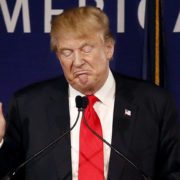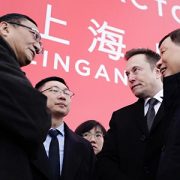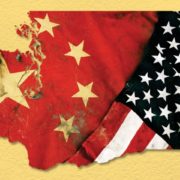August 22, 1991 is a date that belongs to the history of Russia, when it sanctioned the failure of the conservative coup against Soviet Party Chief Mikhail Gorbachev and the dissolution of the USSR. Yet it is a crucial date for the history of China, too.
It proved to the Communist Party of China a complex mix of ideas. It confirmed to Beijing’s leaders that the violent crackdown in Tiananmen Square on June 4, 1989 was justified, otherwise China would also have followed the Soviet fate. Moreover, it was evidence that China needed a new social contract to relaunch its economy and society lest it tumble into the Soviet stagnation trap that caused its downfall.
The 1989 absolute crackdown gave way to Deng’s 1992 nanxun, the voyage to the south of the old paramount leader. He thus restarted a season of freewheeling liberalizations. The brave youngsters craving democracy in 1989, less than three years after were given the opportunity to make money without any strings attached and have the life they wanted without the old puritanical communist mores, provided they kept away from politics.
The subsequent evolution of Russia, confusion of Boris Yeltsin’s times, and new concentration of power and assertiveness under President Vladimir Putin backed up the point. Somehow, the evolution of Russia has also worked for decades as a cautionary tale for China about what might happen in Beijing if things go wrong – China cannot afford to loosen up too much or it will be overwhelmed, as happened to Gorbachev’s USSR, and Putin’s Russia confirmed it, the only way for a country like Russia, or China, is to be tough.
Moreover, the events of 1989 concentrated ultimate political power in the hands of the party, which then in 1992, with that new social contract, gave it away on a discretionary basis, without many clear rules. This led to a system of patronage between officials and entrepreneurs, bypassing the official red tape but without establishing true transparent and open-market rules. This system then gave rise to the far-reaching sleaze and dishonesty that almost brought down China and was addressed by the anti-corruption campaign launched by President Xi Jinping.
This whole Chinese Party history of the past 30 years was based on the assumption that no effective third way existed in 1989. Either the party would surrender to the movement, or it would ruthlessly crack it down without withdrawing a single step. Surrender was inconceivable, so it was necessary to close it all in 1989 and free it all in 1992.
Yet three decades years later, the recent Hong Kong experience and the ongoing bitter trade dispute with the United States may cast that lesson in a different light.
The difference in Hong Kong
The experience of the past five months in Hong Kong could attest to a different story. China has both stepped back, by scrapping the controversial extradition bill that had lit the fuse of the protests, and it had also regained some measure of social control without recourse to massive use of violence like in Tiananmen. In the meantime, as a financial center, Hong Kong has suffered but hasn’t economically collapsed, as basically happened to China in the aftermath of the 1989 crackdown.
Of course, now the historical conditions are different. Thirty years ago, China really was a developing country, which the US and the Western world hoped to groom into “one of us”, so that it could become a “responsible stakeholder”, as then US Deputy Secretary of State Robert Zoellick put it in 2005. Now, the US and most of the Western world lost hope that Beijing can be “one of us”, and they are groping for ways to deal with this very weird and scary being that is China.
The Hong Kong experience is therefore even more important. China has much less international political leeway than 30 years ago, when its choices had little or no global impact. Now Beijing is much more politically and economically important in the world and therefore is under a much closer watch.
Perhaps, then Hong Kong tells China now that if 30 years ago China had taken a longer and more patient route in dealing with the protests and internal party dissenting views, perhaps the bloody crackdown could have been avoided and the following wave of massive disruptive corruption could have been averted. The history of China and the world would have been much different.
History can’t be played back like a videogame hitting a snag, but there is a lot of room for reconsideration about the future.
In Hong Kong, a positive role is also being played by Christian groups and the Catholic Church. Cardinal John Tong and the Holy See invited prudence, dialogue, and recourse to nonviolence. Unlike in other places, in Hong Kong religion was not used for or against the protests.
This element of course did not exist in China 30 years ago, but it is revealing about a possible future for China. The Church in Hong Kong is certainly not controlled by the Party and just because of that, because it is truly independent, it has credibility with both the government and the protesters. It can help to find a reliable means of mediation. If the Church were to be totally under Party control, it would have no social credibility and the government’s overall sway on the situation would be significantly more difficult.
Honesty in true independence
Without true independence, there is no true honesty. This problem might have been irrelevant in China until a few years ago when there was a favorable international environment and decentralization of powers allowed each small local mistake to compensate for one another. Now, with a growing unfavorable international environment and high concentration of power, mistakes can’t sort themselves out and dishonesty can easily push things astray.
Moreover, because in Hong Kong a third way was chosen, neither a ruthless crackdown nor a boundless surrender to the protests, the experience about the destiny of the Soviet Union and Russia is of little help to Beijing.
This is a very different situation for the Party, which is possibly out of its comfort zone; but it is also producing much better results for the territory and gathering new important lessons that the Party could use in China.
One can reasonably foresee that in a few months the situation in Hong Kong will be calm again, but this will not have resolved the basic problems, which are both socio-economic and political. People need more basic well-being, opportunities for social mobility, and political representation. Moreover, Hong Kong can’t be an amusement park for rich Mainlanders on convenient shopping sprees.
That is, after calm settles, Hong Kong will need a new social contract, as happened in 1992 after the Tiananmen crackdown. However, this should be sounder than the 1992 one, because Hong Kong is a showcase of China in the world. Therefore, the social contract should also satisfy the world looking at Beijing.
This is a whole new world for China and Hong Kong, but something they should prepare for now. Another possibility is that Beijing doesn’t think big, and keeps everything on a day to day basis. This could work or not in the short run, but will surely create much bigger problems for China and Hong Kong in the medium and long term.






perceptive, insightful and very thought provoking.